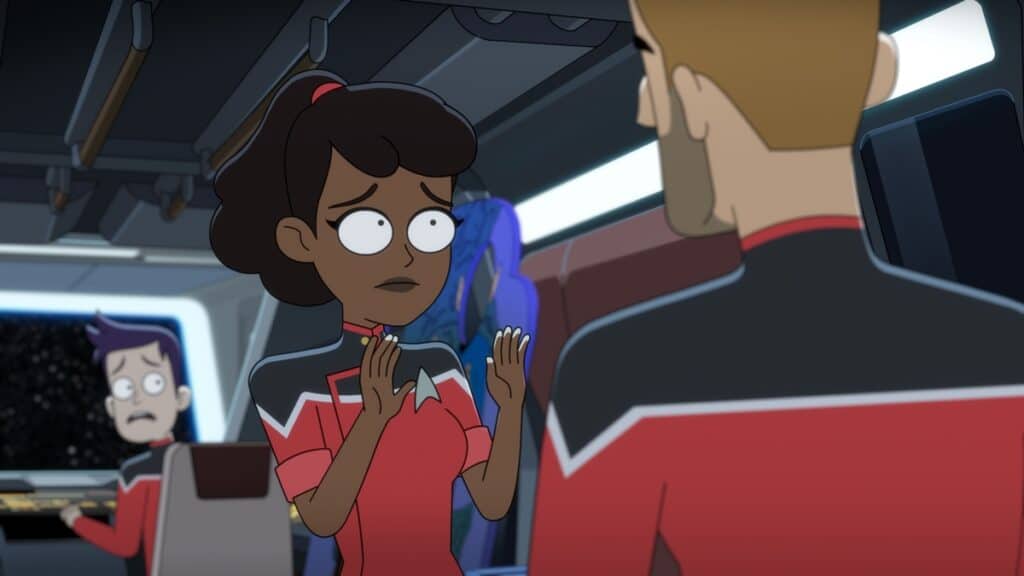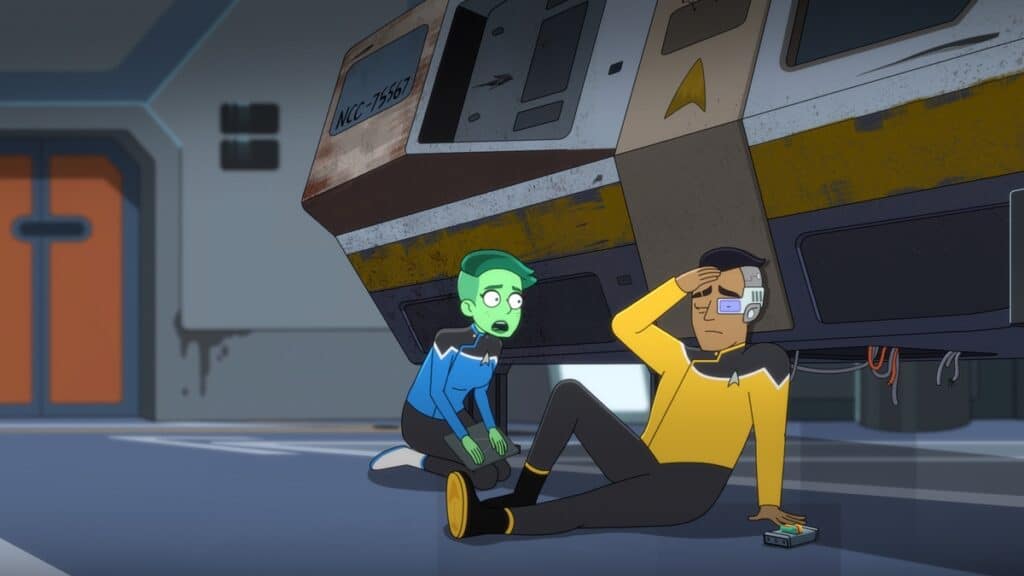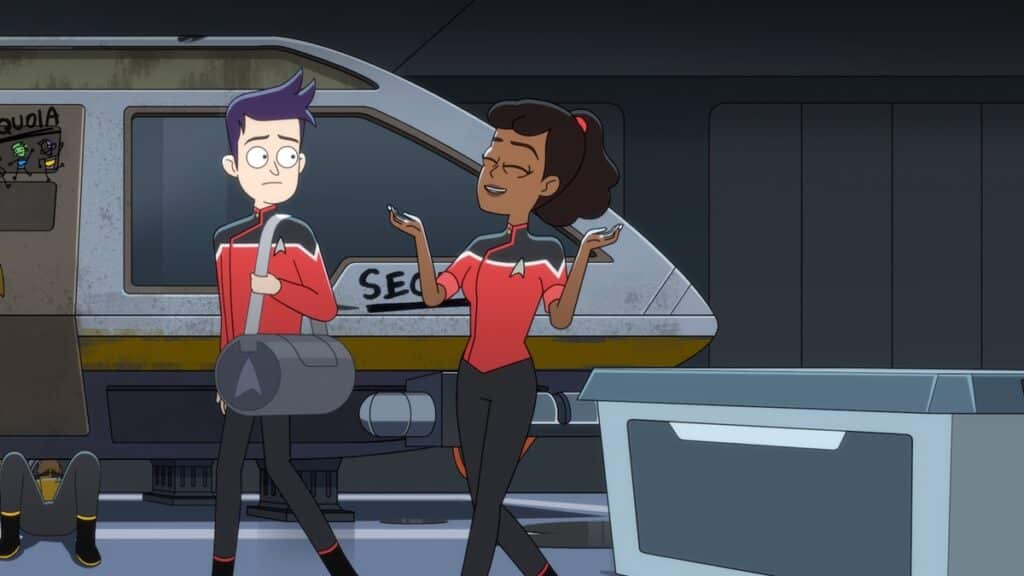Read also:
How to Watch FX Live Without CableHow To Watch AMC Without CableHow to Watch ABC Without CableHow to Watch Paramount Network Without CableImportant reveals about Rutherford’s past pave the way for an optimistic view of humanity’s future.
For a time in the Star Trek fandom, it was fashionable to bash Starfleet, or at least deconstruct it a bit. The complaints were legion: too stodgy, too controlling, too complicit, too myopic, too doctrinaire, too militaristic. Since the Federation represents a science fiction-y reflection of the United States, it’s natural for Trekkies and casual fans alike to consider the blind spots of this fictional equivalent in parallel to critiques of the real-life institutions it mirrors. The franchise itself, aspirational though it may be, has deliberately offered viewers plenty of fuel for those criticisms over the years.
But more recently, a funny thing has happened. While there’s still great sport in highlighting instances in which these mighty space heroes fail to live up to their ideals, there’s been a broader move to recognize the beneficial values that Starfleet and the Federation represent. In tumultuous times in the U.S. and across the globe, the principles of mercy, diplomacy, cooperation, mutual respect, and shared support feel that much more inspirational and commendable. Recognizing the benefits of that brand of camaraderie and collaboration has become as salient now as any deconstruction was then.
That’s the cinch of Ensign Rutherford’s (Eugene Cordero) unfortunate but instructive run-in with his bad boy former self. “Reflections” sees the simple act of Tendi (Noël Wells) clearing his implant’s cache result in the consciousness of pre-implant Rutherford taking over his mind. The conceit gives us a glimpse of what the young engineer was like before he became the chipper, tech-outfitted pal we know and love.

In short, he was kind of an asshole. Pre-Implant Rutherford is apt to hit on then insult women, steal Starfleet vessels without a second thought, dump on California class ships, and worst of all, use force on Tendi en route to saving his own hide. And that’s just what he does in the here and now! Flashbacks and exposition reveal that he also built unsafe, off-the-books vessels to conduct dangerous races through the neutral zone in order to fund projects his Starfleet superiors wouldn’t allow him to pursue. His rude, rule-breaking selfishness is a marked contrast from our Rutherford’s sunny disposition and willingness to help wherever he’s needed.
In a nutshell, Pre-Implant Rutherford believes in and stands for every complaint about Starfleet. He bristles at safety regulations. He complains about not being allowed to act independently. He’s galled by having to fit everything within the guardrails of protocol. He grouses about regulations limiting imagination, holding him, and by extension, everyone back from achieving great things that don’t necessarily fit within Starfleet’s regimented, idealistic view of the galaxy.
When he and the current Rutherford compete to see who will regain control of their collective mind, it’s not just a serious battle over what Rutherford’s personality will be from here on out; it’s a referendum on Starfleet itself.
[”Reflections” is] a chance for writer/creator/showrunner Mike McMahan to both raise and poke fun at common fan complaints about Starfleet.
The main plot dovetails perfectly with the B-story, where Mariner (Tawny Newsom) and Boimler (Jack Quaid) must staff the Starfleet recruitment booth on Tulgana IV. Strict orders from Commander Ransom (Jerry O’Connell) forbid them from leaving their booth under any circumstances, lest they be banished to [shudder] Starbase 80. The assignment puts Mariner in an unusual position. Normally the first to highlight the flaws of Starfleet, she’s compelled to defend it from a host of critics from outside the organization.
Beyond the character stakes, though, it’s also a chance for writer/creator/showrunner Mike McMahan to both raise and poke fun at common fan complaints about Starfleet. Truthers ask probing questions that make comic hay from the ambiguity of Deep Space Nine’s ending or the unresolved cliffhanger from The Next Generation’s first season finale. Onlookers rehash longtime internet arguments over whether or not Starfleet is a military organization. A pair of outpost scientists tweak Boimler and Mariner for the constant changes and inconsistencies of Starfleet uniforms across the fleet. Beyond the fun of seeing fan gripes elevated to canon, it seems like every last demeaning question will set Mariner off and make her leave her post, a fun comedy setup.
None sets her off more than the sly needler at the neighboring table for the Independent Archeologists Guild. This agitator scares off potential recruits by offering the dimmest possible view of Starfleet. Boring jobs, endless battles, Borg assimilations, and, worst of all, no freedom or independence. She aligns with Pre-Implant Rutherford, smugly griping about how Starfleet pens you in. That’s something she can speak to with authority as someone who abandoned a posting on a prime vessel to follow her own bliss without the organization’s baggage or restraints. If anyone’s barbs could get under Mariner’s skin, it’s hers.

And yet, that’s the fun twist of “Reflections.” It’s actually the comparatively serene Boimler who goes off after [gasp] one of the jerky visitors tosses away his pip. He goes on an amusing rant/rampage that covers everything from how none of these people would be here were it not for the brave heroics of Starfleet to how the Wadi from the infamous “Move Along Home” installment of Deep Space Nine should stop trapping people in games. His rejoinders are the opposite of a Comic Book Guy-style tirade. Instead, they’re a blistering broadside against not only the type of nitpickery and debates over geeky minutiae that can consume pestersome Trekkies (see: your humble reviewer) but also the broader impulse to take a dim view of Starfleet despite its achievements and value.
His planting that flag in…extreme terms ends up being just what the holographic doctor ordered. When Ransom returns to check in on his charges, it’s Boimler who’s running amok through the intergalactic job fair. Meanwhile, Mariner is steady at her station, parlaying her partner’s dramatics into positive reasons to develop that sort of passion about your job and what Starfleet officers can accomplish. It’s another tribute to how the duo achieves great things together, albeit in a trademark unorthodox way.
Therein lies the not-so-subtle theme of “Reflections,” an episode that is as profound and stirring as it is hilarious in its spoofs and takedowns of fandom arguments. Whatever Starfleet’s sins, its values are worth hanging onto, and more than that, its chief ideal—of cooperation, both interstellar and interpersonal—is its greatest feature.
[F]or all its Easter eggs and jokes about the excesses of the canon, Lower Decks is more than a spoof of Star Trek; it’s an affirmation of it
That’s what gives our Rutherford the edge over his Pre-Implant equivalent. The pair decide to construct their own vessels and race through the Neutral Zone to determine who can claim sole control of their shared brain. Current Rutherford seems reverently stuck in the already-known and Starfleet-approved, choosing to build the Delta Flyer from Voyager. Pre-Implant Rutherford, on the other hand, comes up with his own, more novel, nearly unprecedented racer, laughing at his older counterpart’s lack of imagination.
And for a minute, it looks like Pre-Implant Rutherford will win. His ship’s speed and dexterity seem to give him the edge. But when a Romulan Bird of Prey decloaks and fires on them both, it’s what’s inside current Rutherford’s ship that matters most—his friends. Given the ability to dream up anything he wants to win this race, the modern-day Rutherford imagines not just fancy gizmos or tools but also the comrades and confidants with the skills and mutual support to see their way through anything.

He goes one step further, rescuing Pre-Implant Rutherford and, in the process, wins even him over. The young Rutherford may have looked askance at his older counterpart, disdaining him as too dorky, overly enthusiastic, and inveterately rule-bound. But it was young Rutherford trying to go it alone and bend the rules because he believed he could take on anything all by himself that caused the accident, which made the implant necessary in the first place. In the end, Pre-Implant Rutherford accepts that growth is good, and whatever the means, the version of him who became a model Starfleet officer ultimately changed for the better.
Despite that epiphany, all is not necessarily well at the end of “Reflections.” Our Rutherford regains control of his body (with a hug from Tendi for good measure). Still, he also finally remembers the shadowy figures with unclear motives who installed his implant and programmed him to think it was a voluntary procedure. (A Romulan plot? Section 31?) And despite her success, Mariner receives a tempting offer from the thieving archaeologist to give up the strictures of Starfleet and strike out on her own, an invitation which portends interesting things, as her exit from the service, whether voluntary or involuntary, remains a live issue.
At the end of the day, though, Mariner, Boimler, and especially Rutherford all defend and embody the best that Starfleet can be. What they champion is not just the defense of the galaxy or a Pollyanna devotion to kindness and empathy. It is the camaraderie that has seen them through so much. They’ve seen the importance of relying on a team and understanding that trading some independence for that sort of support and friendship is a winning wager every time. Their success and bond speak to the way that, for all its Easter eggs and jokes about the excesses of the canon, Lower Decks is more than a spoof of Star Trek; it’s an affirmation of it.